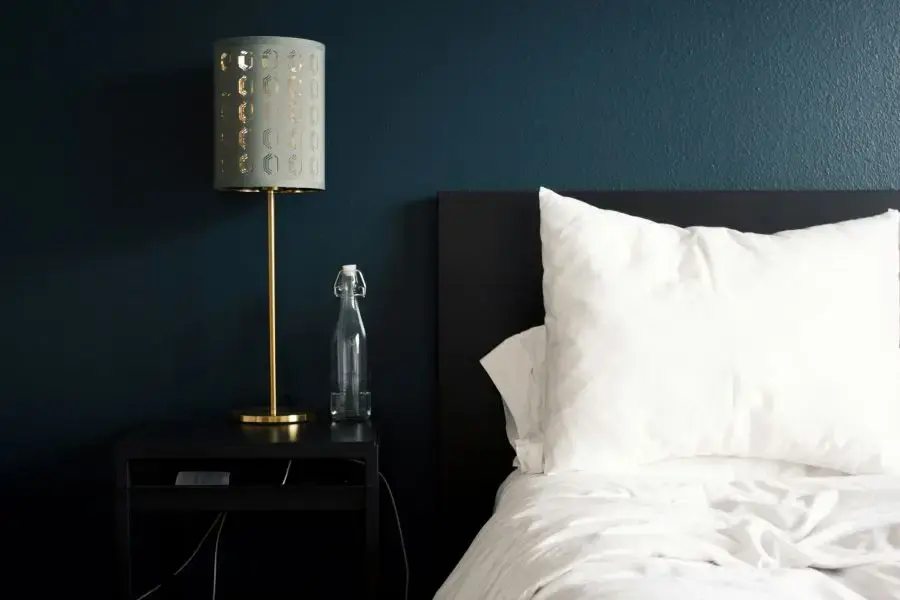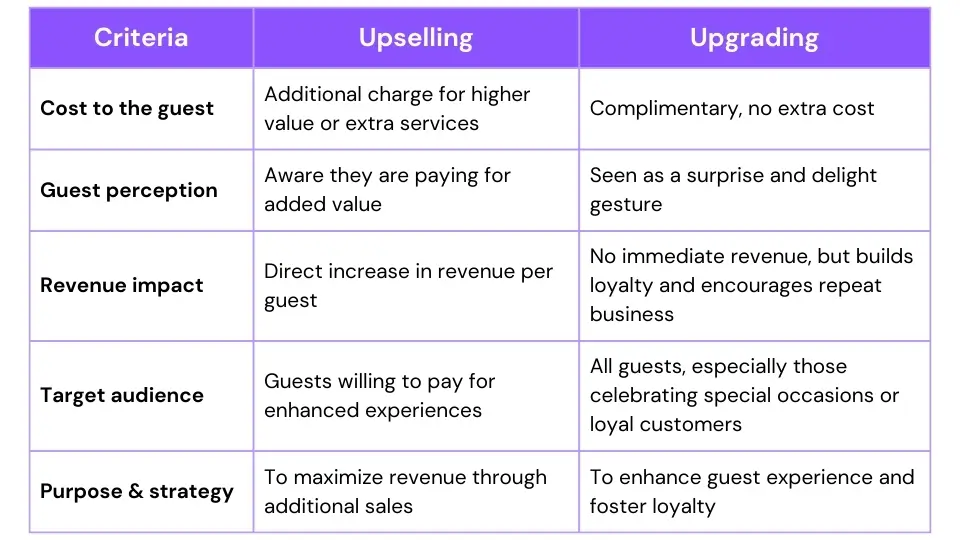Hotels are constantly seeking innovative ways to enhance guest experiences and increase revenue. Upselling and upgrading are two powerful strategies that can achieve these goals. However, while these terms might seem similar, they involve different approaches and can result in varied outcomes depending on how they are applied.
We know that deciding when and how to use each strategy can be challenging for hotel staff, especially when aiming to meet both guest expectations and business objectives.
So, how can we effectively navigate the nuances of upselling and upgrading to maximize guest satisfaction and profitability? This article analyzes the differences between these two techniques and how and when to implement each strategy.

What is upselling?
Upselling is a sales strategy in which a hotel offers guests an enhanced experience by suggesting a higher-priced product or additional services than what they originally booked. The goal is to encourage guests to spend more by highlighting the value and unique features of upgraded offerings.
For instance, a guest might be offered a suite with a better view, larger space, or premium amenities instead of a standard room. Upselling can also extend to additional services, like a spa package, exclusive dining experiences, or early check-in and late check-out options.
Examples of upselling in hotels
-
Room upgrades: At check-in, staff might offer guests an upgrade from a standard room to a deluxe suite with better views or additional amenities, highlighting the added comfort and exclusivity for a nominal extra cost.
-
Add-on services: Guests booking a stay may be encouraged to add services like a spa treatment or a dining package, enhancing their experience and allowing the hotel to increase revenue from each guest.
Benefits of upselling for hotels
-
Increased revenue per guest: Hotels can significantly boost their revenue per guest by persuading guests to opt for higher-value options. This incremental revenue is crucial, especially during peak seasons when occupancy is already high, and every additional dollar earned per room directly impacts the bottom line.
-
Enhanced guest satisfaction: Tailoring offers to guests' preferences can create a more personalized and memorable experience. For example, if a guest is celebrating a special occasion, suggesting an upgraded room with a unique amenity can make their stay more memorable and increase the likelihood of a positive review.
-
Optimized inventory management: By filling premium rooms that might remain vacant, hotels can ensure better utilization of their assets. For example, offering an affordable upgrade can help fill higher-category rooms without significantly discounting them during slower periods.
-
Strengthened customer loyalty: When guests feel they have received value and personalized attention, they are more likely to return. For instance, a guest offered a dining package featuring their favorite meal, which they had previously enjoyed at the hotel, may feel more valued and connected to the hotel, making them more likely to return for a similar experience.
-
Increased awareness of services: Upselling also offers an opportunity to inform guests about additional services they might not have considered. Increasing the likelihood of them taking advantage of these offers in the future.
By thoughtfully leveraging upselling strategies, hotels can create win-win situations in which guests enjoy enhanced experiences while the hotel benefits from increased revenue and stronger guest relationships.
What is upgrading?
Upgrading involves offering a guest a superior room or service at no additional cost. Unlike upselling, which focuses on generating extra revenue by promoting paid enhancements, upgrading is a complimentary gesture that surprises and delights guests, providing an enhanced experience without requiring them to pay more.
Examples of upgrading in hotels
-
Room upgrades: Hotels might upgrade a guest from a standard room to a suite without any additional charge, particularly if the guest is celebrating a special occasion or if higher-category rooms are available that need to be filled.
-
Complimentary services: A hotel may offer additional perks, such as free breakfast, spa access, or late checkout, to frequent visitors or guests who might have encountered a minor inconvenience during their stay.
Benefits of upgrading for hotels
-
Enhanced guest satisfaction: Providing unexpected upgrades can significantly improve the guest experience, creating memorable moments that exceed expectations. Leading to more positive feedback and stronger emotional connections with the hotel, fostering a more loyal customer base.
-
Positive word-of-mouth and reviews: Guests who experience an upgrade often share their positive experiences with friends, family, and social media followers. This word-of-mouth marketing can be precious, as personal recommendations are highly trusted and can attract new guests to the hotel.
-
Brand differentiation: Offering upgrades can help a hotel differentiate itself from competitors by showcasing its commitment to exceptional customer service and personalized experiences. This strategy demonstrates a focus on guest well-being and satisfaction, which can attract discerning travelers who value quality and attention to detail.
-
Increased guest loyalty and retention: When guests receive complimentary upgrades, they are more likely to feel appreciated and valued, leading to increased loyalty. This sense of loyalty can result in repeat bookings, as guests who feel strongly connected to a hotel are more likely to return. Moreover, loyal guests are often less price-sensitive and more inclined to choose a familiar brand over competitors, even with slightly higher rates.
By strategically offering upgrades, hotels can create a sense of exclusivity and care, leaving guests with a lasting impression that encourages future stays and positive endorsements. Upgrading is not just about filling rooms; it's about creating memorable guest experiences that build long-term loyalty and enhance the hotel's brand reputation.
Main differences between upselling and upgrading
While upselling and upgrading may seem similar, they have distinct characteristics and serve different purposes in the hospitality industry. Understanding these differences can help hotel staff choose the appropriate strategy to enhance guest satisfaction and maximize revenue.

1. Cost to the guest
Upselling involves offering additional services or a higher room category for an extra charge. The goal is to encourage guests to spend more by highlighting the benefits and value of the upsell. For example, a guest may be offered a suite instead of a standard room for an additional fee.
On the other hand, an upgrade is a complimentary gesture in which the guest is given a better room or service at no extra cost. For example, a hotel could offer a guest a room with a better view or more space without charging them extra.
2. Guest perception
Upselling is seen as a proactive sales effort where the guest is -they are paying for added value. It’s typically more overt and requires clear communication of the benefits to justify the additional cost.
Upgrading is perceived as a surprise and delight tactic. Because it is a complimentary gesture, it often exceeds the guest’s expectations, creating a "wow" factor that enhances their overall experience and makes them feel appreciated.
3. Revenue impact
Upselling directly contributes to increased revenue per guest. By convincing guests to purchase higher-value options or add-ons, hotels can boost their earnings and maximize the value of each booking.
Upgrading does not generate immediate revenue since it is a complimentary service. However, it can lead to indirect financial benefits by fostering customer loyalty, generating positive reviews, and encouraging repeat business.
4. Target audience
Upselling is best suited for guests willing to spend more to enhance their stay, such as business travelers looking for convenience or luxury travelers seeking exclusive experiences.
Upgrading can be applied to a broader audience, including all guests, regardless of their budget. It can be especially effective for guests celebrating special occasions or for loyal customers, enhancing their experience and reinforcing their connection to the brand.
5. Purpose and strategy
Upselling aims to maximize revenue by offering additional value to guests willing to pay for a better experience. It requires staff to be well-trained in identifying upsell opportunities and communicating the benefits effectively.
Upgrading builds guest loyalty and enhances brand perception by providing unexpected value. This strategy is often used to surprise guests, rectify service issues, or differentiate the hotel from competitors.
By understanding these key differences, hotel staff can more effectively decide when to use upselling or upgrading. This ensures that each guest has a personalized experience that aligns with their preferences and enhances their stay. Using these strategies appropriately can lead to increased revenue and long-term guest loyalty.
Decision guide – when to upsell vs. upgrade
Whether to upsell or upgrade depends on several factors, including the guest type, preferences, hotel occupancy, and business goals. This guide will provide scenarios and a flowchart to help hotel staff make informed decisions that align with both guest expectations and the hotel’s objectives.
Scenarios to consider for upselling or upgrading
1. Business travelers
- Scenario: A business traveler checks in and mentions they have a busy schedule with back-to-back meetings.
- Decision: Upsell. Offer additional services that enhance convenience and comfort, such as a room with a work desk, access to a business lounge, or high-speed internet for an extra fee. Business travelers are often willing to pay for services that make their stay more productive and efficient.
2. Guests celebrating a special occasion
- A couple mentions they are celebrating their anniversary during check-in.
- Upgrade. Offer a complimentary room upgrade to a suite or a room with a special view. Include a small welcome gift like a bottle of champagne or chocolates. This gesture enhances their celebration and fosters goodwill, increasing the likelihood of positive reviews and return visits.
3. Families with children
- A family arrives with young children and requests a quieter, more spacious room.
- Upsell. For an additional cost, suggest a family suite or a larger room with additional amenities such as a kitchenette or extra beds. Highlight these options' convenience and comfort, especially for families looking for a more relaxed and enjoyable stay.
4. Frequent guests or loyalty program members
- A guest who frequently stays at the hotel is checking in again.
- Upgrade. Offer a complimentary room upgrade or additional amenities as a gesture of appreciation for their loyalty. This can strengthen the relationship with the guest and encourage continued patronage, reinforcing their loyalty to the brand.
5. Guests booking during a low occupancy period
- The hotel has low occupancy, and a guest books a standard room.
- Upgrade. Provide a complimentary upgrade to a higher-category room to create a positive guest experience and fill rooms that might remain vacant. This approach can help manage occupancy levels while also delighting the guests.
6. Guests requesting additional amenities
- A guest inquires about spa services or dining options upon arrival.
- Upsell. For an additional fee, offer a package that includes the room and desired amenities, such as a spa treatment or dinner at the hotel restaurant. This will meet the guests' needs and increase the total spend per guest.
Conclusion
By carefully evaluating the specific circumstances, hotels can determine whether upselling or upgrading is the right approach for a particular guest or situation, optimizing the guest experience while driving revenue and loyalty.
Furthermore, hotel staff must be well-trained in both upselling and upgrading techniques, ensuring that they can effectively communicate the value proposition to guests and address any concerns or questions that may arise during the process. Building a solid rapport with guests and understanding their preferences can significantly increase the success rate of upselling and upgrading efforts, enhancing guest satisfaction and loyalty in the long run.